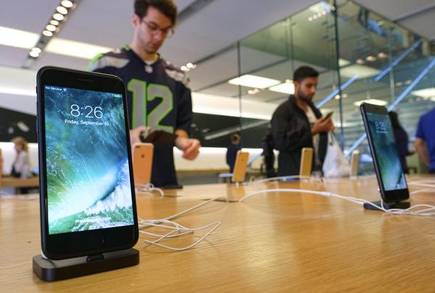New laser system can remotely charge your smartphone

Scientists, including those of Indian origin, have developed a laser emitter that can safely charge a smartphone across a room as quickly as a standard USB cable.
Researchers mounted a thin power cell to the back of a smartphone, which charges the smartphone using power from the laser.
They custom-designed safety features — including a metal, flat-plate heatsink on the smartphone to dissipate excess heat from the laser, as well as a reflector-based mechanism to shut off the laser if a person tries to move in the charging beam’s path.
“We have designed, constructed and tested this laser-based charging system with a rapid-response safety mechanism, which ensures that the laser emitter will terminate the charging beam before a person comes into the path of the laser,” said Shyam Gollakota, associate professor at the University of Washington in the US.
“In addition to the safety mechanism that quickly terminates the charging beam, our platform includes a heatsink to dissipate excess heat generated by the charging beam,” said Arka Majumdar, from University of Washington.
“These features give our wireless charging system the robust safety standards needed to apply it to a variety of commercial and home settings,” he said.
The researchers designed the laser emitter to terminate the charging beam when any object — such as part of a person’s body - comes into contact with one of the guard beams.
The blocking of the guard beams can be sensed quickly enough to detect the fastest motions of the human body.
The next generation of nano-scale optical devices are expected to operate with Gigahertz frequency, which could reduce the shutter’s response time to nanoseconds, said Majumdar.
The beam charges the smartphone via a power cell mounted on the back of the phone.
A narrow beam can deliver a steady 2W of power to 15 square-inch area from a distance of up to 4.3 metres, or about 14 feet.
The emitter can be modified to expand the charging beam’s radius to an area of up to 100 square centimeters from a distance of 12 metres, or nearly 40 feet.
This extension means that the emitter could be aimed at a wider charging surface, such as a counter or tabletop, and charge a smartphone placed anywhere on that surface.
“The beam delivers charge as quickly as plugging in your smartphone to a USB port. But instead of plugging your phone in, you simply place it on a table,” said Elyas Bayati, doctoral student at University of Washington.
Hi! I am a robot. I just upvoted you! I found similar content that readers might be interested in:
https://www.siasat.com/news/new-laser-system-can-remotely-charge-smartphone-1321607/
Looks like you stole this post mate? Any explanation?